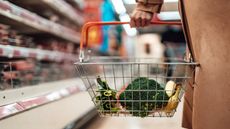NIESR: ‘Squeezed’ middle class households now £2,560 a year worse off
Britain will feel like it’s in recession even if it isn't after a significant drop in middle-class income - and the poorest households are even worse off.


‘Squeezed’ middle class households are around £2,560 per year worse off as a result of Covid and the cost of living crisis, a respected think tank has said.
This shortfall represents 8% of their income and comes despite government support such as the Energy Price Guarantee (EPG) and the £400 energy grant.
The National Institute of Economic and Social Research (NIESR) said the distributional shock of the crisis is not the same across all income groups, however, with the UK’s poorest households being around £4,000 a year worse off - a shortfall that represents around 25% of their income.
Subscribe to MoneyWeek
Subscribe to MoneyWeek today and get your first six magazine issues absolutely FREE

Sign up to Money Morning
Don't miss the latest investment and personal finances news, market analysis, plus money-saving tips with our free twice-daily newsletter
Don't miss the latest investment and personal finances news, market analysis, plus money-saving tips with our free twice-daily newsletter
NIESR was the first major forecaster to predict that Britain would avoid a recession in February, amid growing optimism across the EU that dire forecasts for 2023 would not come true.
However, all households will still experience a hit to their living standards this year, NIESR warned, driven mostly by low wage growth not offsetting the impact of high food and energy bills along with increased housing costs.
“The UK is likely to avoid a ‘technical recession’ in 2023. Though, with GDP growth of 0.1% in the first quarter of 2023 relative to the fourth quarter of 2022 and a further 0.3% of growth in the second quarter of 2023, it will feel like a recession for many,” NIESR said.
Inflation is expected to remain continually above target, falling gradually from its current double-digit level to reach 5.4% by the end of 2023. “With inflation remaining persistently elevated, we anticipate the MPC will opt for a rate rise to 4. 5% today, with the possibility of a further rise to 4.75% conditional on future inflation developments,” it said.
While unemployment was at a historic low, households are still worse off, said Professor Adrian Pabst, deputy director for public policy. “Anaemic, disappointing economic growth equates to falls in disposable income for households despite them working - they are the working poor - and this has been a situation in the making over many years.”
Professor Stephen Millard, deputy director for macroeconomic modelling and forecasting points to the need for a credible medium-term plan and commitment to levelling up that would involve borrowing to invest. “Right now we are in a low growth, low investment mindset after years of the political and electoral cycle dictating policy. Debt and deficit could look different if we borrowed to invest.”
The think tank recommends increasing spending on public investment to around 3% of GDP over the next five years as opposed to letting it fall to 2.2% of GDP.
“It is our position that a lack of public investment has deepened, and will continue to deepen, the low growth and low productivity traps countrywide as well as exacerbate regional inequalities,” it explained
It also recommends unifying the fragmented funding streams so that the promises around ‘Levelling Up’ can be delivered.
“We continue to argue for the creation of a National Development Bank endowed with around £50bn worth of finance to support investment projects across regions and sectors.”
Katie Binns is an award-winning journalist, and former Sunday Times writer where she spent 10 years covering news, culture, travel, personal finance and celebrity interviews. She has also written for the Times, Telegraph, i paper and Woman and Home magazine.
Her investigative work on financial abuse has examined the response of banks, the Financial Ombudsman and the child maintenance service to victims, and resulted in a number of debt and mortgage prisoners being set free.
-
-
 Investment trust discounts hit 2008 levels. Here’s how to profit
Investment trust discounts hit 2008 levels. Here’s how to profitInvestment trust discounts have risen to levels not seen since 2008, here are three trusts looking to buy to profit.
By Rupert Hargreaves Published
-
 A luxury stock to buy at a high street price
A luxury stock to buy at a high street priceInvestors wrongly consider Watches of Switzerland a high-street outlet.
By Dr Matthew Partridge Published
-
 UK wage growth hits a record high
UK wage growth hits a record highStubborn inflation fuels wage growth, hitting a 20-year record high. But unemployment jumps
By Vaishali Varu Published
-
 UK inflation remains at 8.7% ‒ what it means for your money
UK inflation remains at 8.7% ‒ what it means for your moneyInflation was unmoved at 8.7% in the 12 months to May. What does this ‘sticky’ rate of inflation mean for your money?
By John Fitzsimons Published
-
 VICE bankruptcy: how did it happen?
VICE bankruptcy: how did it happen?Was the VICE bankruptcy inevitable? We look into how the once multibillion-dollar came crashing down.
By Jane Lewis Published
-
 Would a food price cap actually work?
Would a food price cap actually work?Analysis The government is discussing plans to cap the prices of essentials. But could this intervention do more harm than good?
By Nicole García Mérida Published
-
 What is Warren Buffett’s net wealth?
What is Warren Buffett’s net wealth?Features Warren Buffett is one of the world’s richest people. But how did he make his money?
By Jacob Wolinsky Last updated
-
 What is Rihanna's net worth?
What is Rihanna's net worth?Features Rihanna became the youngest self-made billionaire in 2022. Here’s how she made her money.
By Jacob Wolinsky Published
-
 UK inflation slides to 8.7% - what does it mean for your money?
UK inflation slides to 8.7% - what does it mean for your money?News Inflation has dropped below 10% for the first time in months, but with food prices at a 45-year high, is this good news and what does it mean for your money?
By Tom Higgins Published
-
 What is Bill Gates's net worth?
What is Bill Gates's net worth?Features Bill Gates is one of the world’s richest people, but how did he make his money?
By Jacob Wolinsky Last updated









